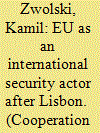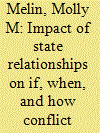| Srl | Item |
| 1 |
ID:
112412


|
|
|
|
|
| Publication |
2012.
|
| Summary/Abstract |
This article argues that a holistic approach is important when studying the European Union's (EU) role as an international security actor, but at the same time it identifies problems in adopting such a comprehensive research agenda. The holistic approach entails that the research must include 'new' security problems, such as climate change, but also relevant policies and instruments outside the framework of the Common Security and Defence Policy (CSDP). However, owing to conceptual, legal and political obstacles, this has been difficult to achieve; as a consequence, existing research on the EU as an international security actor tends to narrow down the focus to just one framework: the CSDP and its operations. This may lead to a distorted image, because the EU's role in international security surpasses any single policy framework. The contribution of this article is twofold. First, it sets the framework for the comprehensive research agenda concerning the EU as an international security actor. Second, it identifies key obstacles that are making this holistic approach methodologically and conceptually difficult. In this context, the Lisbon Treaty, formally abandoning the pillar structure of the EU, provides an opportunity to mitigate at least some of these roadblocks.
|
|
|
|
|
|
|
|
|
|
|
|
|
|
|
|
| 2 |
ID:
106928


|
|
|
|
|
| Publication |
2011.
|
| Summary/Abstract |
This paper examines if, when, and how states act to manage militarized disputes. I argue that the relationship between the third party and disputants, the management history, and the characteristics of the conflict help us understand when management occurs and the management techniques employed. I find substantial evidence that biased third parties are quick to offer management services and to employ economic and diplomatic techniques. Conditions that increase the perceived probability of conflict resolution, such as previous conflict management, and factors that lower the cost of conflict management, such as costly conflict, lead to the timely use of diplomatic and verbal techniques. The findings offer significant contributions to both the conflict management and alliance literatures.
|
|
|
|
|
|
|
|
|
|
|
|
|
|
|
|